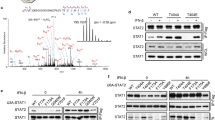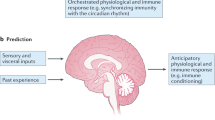Abstract
INTERFERON was discovered1 because of its antiviral properties, but interferon preparations have other biological activities. These include inhibition of transplanted tumours in vivo2 and of cell multiplication in vitro3,4, as well as regulatory roles in the immune response5. The effects of interferon on immune responses in vivo and in vitro have mostly been known as inhibitory, in particular on B-cell functions, whereas we have discovered augmented killer T-cell generation in vitro in the presence of interferon6. As interferon is produced in vivo in the course of acute viral infections (or after vaccination) at a stage when the temperature of the host is elevated7–9 we have investigated the influence of increased temperature on some of the effects of interferon. We report here that elevated incubator temperatures potentiate the antiviral activity, the killer-augmentory properties and the growth-inhibitory action of interferon on a lymphoblastoid cell line (Daudi).
This is a preview of subscription content, access via your institution
Access options
Subscribe to this journal
Receive 51 print issues and online access
$199.00 per year
only $3.90 per issue
Buy this article
- Purchase on Springer Link
- Instant access to full article PDF
Prices may be subject to local taxes which are calculated during checkout
Similar content being viewed by others
References
Isaacs, A. & Lindemann, J. Proc. R. Soc. B 147, 258–267 (1957).
Gresser, I., et al. Proc. natn. Acad. Sci. U.S.A. 63, 51–57 (1969).
Paucker, K., Cantell, K. & Henle, W. Virology 17, 324–334 (1962).
Ho, M. & Armstrong, J. Ann. Rev. Microbiol. 29, 131–147 (1975).
Johnson, H. M. & Baron, S. Crit. Rev. Biochem. 203–227 (1976).
Heron, I., Berg, K. & Cantell, K. J. Immun. 117, 1370–1373 (1976).
Ray, C. G., Gravelle, C. R. & Chin, T. D. Y. J. Pediat. 71, 27–32 (1967).
Kozaki, T. Nagoya J. med. Sci. 32, 113–120 (1969).
Petralli, J. K., Merigan, T. C. & Wilbur, J. R. New Engl. J. Med. 273, 198–201 (1965).
Berg, K., Ogburn, C., Paucker, K., Morgensen, K. & Cantell, K. J. Immun. 114, 640–644 (1975).
Finter, N. B. in Interferons and Interferon Inducers, 2nd edn. (ed. Pinter, N. B.) 135–171 (North-Holland, Amsterdam, 1973).
Böyum, A. Scand. J. clin. Lab. Invest. 21, 31–50 (1968).
Adams, A., Strander, H. & Cantell, K. J. gen. Virol. 28, 207–217 (1965).
Hilfenhaus, J., Damm, D., Karges, H. E. & Manthey, K. F. Arch. Virol. 51, 87–97 (1976).
Lindahl, P., Gresser, I., Leary, P. & Tovey, M. Proc. natn. Acad. Sci. U.S.A. 73, 1284–1290 (1976).
Author information
Authors and Affiliations
Rights and permissions
About this article
Cite this article
HERON, I., BERG, K. The actions of interferon are potentiated at elevated temperature. Nature 274, 508–510 (1978). https://doi.org/10.1038/274508a0
Received:
Accepted:
Issue Date:
DOI: https://doi.org/10.1038/274508a0
This article is cited by
-
Is fever suppression involved in the etiology of autism and neurodevelopmental disorders?
BMC Pediatrics (2003)
-
The effect of temperature on production and function of bovine interferons
Archives of Virology (1984)
Comments
By submitting a comment you agree to abide by our Terms and Community Guidelines. If you find something abusive or that does not comply with our terms or guidelines please flag it as inappropriate.



